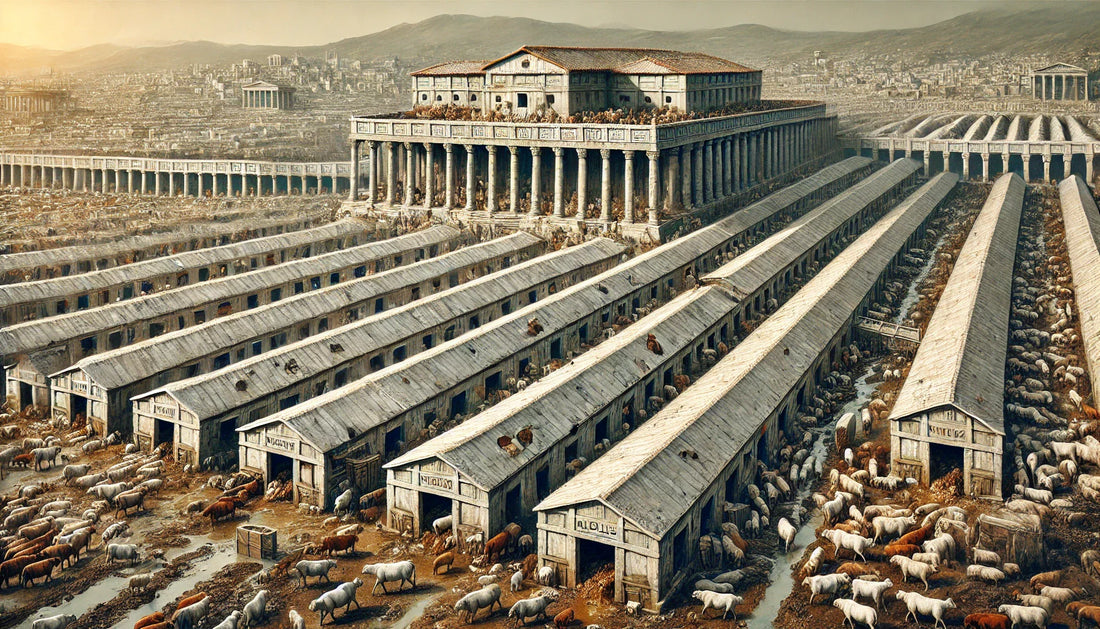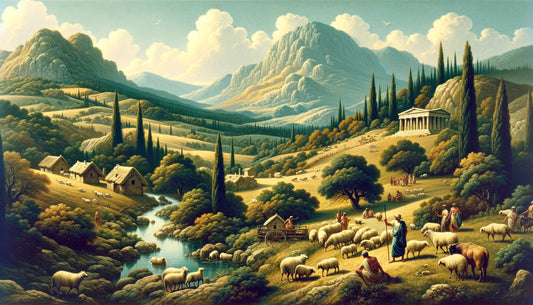
The Augean Stables — Hercules’ Fifth Labour
Continuation of the story The Erymanthian Boar.
With the first two labours, Eurystheus thought he could finish Hercules. That was not the case. It became clear that he had underestimated him, as Hercules ended up conquering the formidable creatures. If the hero were merely a brute of savage strength, he wouldn't have succeeded either in the next two tasks. Nevertheless, the live capture of the two animals, in Ceryneia and Erymanthos respectively, was also successfully accomplished.
This time, Hercules' new mission would be different. The king wanted to frustrate him, to make him suffer from stress. Although the next task posed no danger, its complexity lay in the sheer amount of work, combined with the limited time to accomplish it.
The king quickly sent him west to the city of Elis to clean the Augean stables. He couldn't do it at his own pace, but would only complete the task if he managed to clean them in a single day. The challenge was set.
The Putrid State of the Augean Stables
King Augeas did not have ordinary stables. He boasted livestock with divine properties, meaning they were immortal. In total, he owned more than three thousand heads of cattle. The accumulation of dung was enormous, as the stables had not been cleaned for over thirty years.
The stench of all that manure could be smelled from miles away. Hercules was aware that this task posed no danger, but it was surely designed to make him suffer severely. He would do whatever was necessary to complete the task. Nevertheless, it seemed as if there was a touch of malice intended to humiliate him: leaving that dung heap spotless by removing endless excrement with very little time to finish.
Before starting the work, he requested an audience with King Augeas. He had a plan in mind.
A Task with a Reward
The royal guard escorted Hercules to the court. Once before the king and his advisors, he spoke up.
"Your Majesty, King Eurystheus of Mycenae has sent me here, to your city. By the order of the king and the will of the gods, I ask your permission to clean your divine livestock stables."
"Indeed, I would have never imagined such a divine will offering," responded King Augeas. "It must be that the gods cannot bear to see such praiseworthy livestock suffer in such a dilapidated structure. And who are you, you poor knight, to have suffered such a punishment?"
"My name is Hercules, son of Zeus and Alcmena, from the kingdom of Mycenae."
Upon hearing the name, Phyleus, Augeas' son and present among the advisors, raised his head to enjoy the presence of the hero, whom he already admired.
"So you are the revered Hercules, whose name comes from the four winds?" said the king before pausing. "Has your king, Eurystheus, asked for anything in return for such labor?"
"No, Your Majesty, it is the will of the gods. My king only relays his decree. I must complete the task alone, and I must do it in one day."
"Son, you know what you have done to deserve such a penance, but not even a son of Zeus could accomplish such a feat. Are you aware of what you are saying?"
"Your Majesty, if it did not seem impossible, such a task would not have been assigned to me. With your permission, I would like to make an agreement with you."
"Go ahead. I'm listening attentively..."
"If I manage to clean your stables thoroughly between sunrise and sunset tomorrow, would your highness allow me to keep a tenth of the livestock?"
There was a moment of silence while the king and the advisors looked at each other. King Augeas could not believe what he was hearing. While it was true that it was a bold request, the chances of losing were minimal. "Between sunrise and sunset." Not even a full day to clean that mountain of manure from the stables. It was certain that Hercules could make some progress, but not complete the task. In the king's eyes, it was an impossible feat; therefore, there was no risk of losing livestock.
"I must confess that it is bold to ask me for such a reward," he responded. "But for your bravery and because it would be a great gift if you succeeded, I accept the deal. I recommend you rest well tonight, for tomorrow you have much work ahead."
Just as Hercules wanted, the king accepted his proposal. His plan was unfolding. Now it was time to rest to face the great challenge.
A Deluge of Manure
At dawn, Hercules headed straight for the stables. He had paid close attention to the kingdom’s lands while making his way there. The execution of the second part of his plan started. With determination, he made his way through the manure to reach the first wall of the stables, which faced the foot of the hills. Thanks to his extraordinary strength, he began to puncture the wall at different points with blows.
Once satisfied, Hercules climbed the first hill. On his way to the kingdom, he had noticed that two rivers, the Peneus and the Alpheus, passed through the area. He approached the first river and, using his great strength again, began moving large stones into the middle of the water flow. As the large rocks were added, the course was altered to direct it where he needed it.
The water flowed directly towards the stables area. Pleased with what he had accomplished, Hercules headed towards the second river. He repeated the process, altering its course to direct it at will. Two rivers forcefully flowed directly towards the stables. As expected, the water began to carry away the surrounding manure. Thanks to the holes he had made in the wall, the water entered the enclosures to also sweep away all the filth inside the structures. Now, all that was needed was patience.
The large amount of water descending from the two torrents did not stop at the stables. It continued downwards, carrying all the manure and spreading it throughout the valley of Elis. All the fields surrounding the city were irrigated and fertilized as a result.
Once there was no more dirt to remove from the stables, Hercules decided to rectify the course of the two rivers. He undid the change so as not to alter the environment of the area.
Royal Disloyalty
Hercules returned to King Augeas's throne room to receive his reward. The task had been completed in less than a day, just as he had predicted. The king should have been pleased with the result, and he should have been compensated with the three hundred heads of cattle promised in their agreement. However, the situation did not unfold as Hercules had envisioned.
The king was in a foul mood. He was aware of everything and couldn't imagine that Hercules would actually complete the task. He valued his livestock so much that he did not want to part with any of it.
"Your Majesty, as I promised, I have left the stables spotlessly clean. I present myself before you again to confirm this and to receive my part of the agreement."
"Your reputation is well-earned, young Hercules. I hardly expected you to achieve such a feat," the king responded, carefully choosing his words. "However, you told me this task was a divine mandate, carried out under the orders of your king..."
"That is correct."
"In that case, it means you have performed this task as a slave. I see no reason why I should pay a slave for fulfilling his duty."
"Your Majesty, we reached an agreement!" Hercules replied, irritated. "Your Highness accepted the agreement just yesterday! It is only right to demand that you keep your word."
"I made no such agreement! My counsellors here are my witnesses."
"You did accept the deal, father!" Phyleus interjected, outraged. "I was there and heard it perfectly well."
The king cast an angry glance at his son. While he had his counsellors well tamed, he hadn't expected his own son to expose him.
"There's nothing more to discuss!" the king shouted, rising from his throne. "Guards, escort this young slave out of the city. I never want to see him within my kingdom again. And you, if you want your own livestock, sort it out with your king!"
"I did not expect such baseness from you," Hercules retorted. "I will leave, but this will not end here!"
"Out of my sight!"
Hercules was expelled from Elis. For daring to expose Augeas, Phyleus, his own son, was also banished from the kingdom.
The hero left the royal court enraged by the lack of respect shown to him. However, his mood quickly changed upon receiving the joy and gratitude of the people and farmers of Elis. His feat had resulted in a good season of fertile lands for the kingdom. His fifth labour had been achieved and celebrated with enthusiasm!
To be continued…
Honouring the Legend
Hercules' ingenious plan to clean the stables in record time is a tale of heroism and joy shared by the people of Elis. To immortalize this feat, we offer you this magnificent T-shirt that illustrates how beautiful Augeas's stables were and how immaculate they became.

As we cannot provide you with a sacred piece, we do not want to sacrifice any animal for a piece of clothing. All our items are 100% cotton and made with the utmost respect for the environment. LũM always aims to respect the flora and fauna of our planet.
Thank you for your trust, and may the adventure continue!
Reading list
- Labours of Hercules. Wikipedia, the Free Encyclopedia.
- Fry, S. (2018). Heroes. Penguin Books.
- Hamiltor, E. (1942). Mythology, Timeless tales of Gods and Heroes. Little, Brown and Company.
- Graves, R. (1955). The Greek Myths. Penguin Books.

